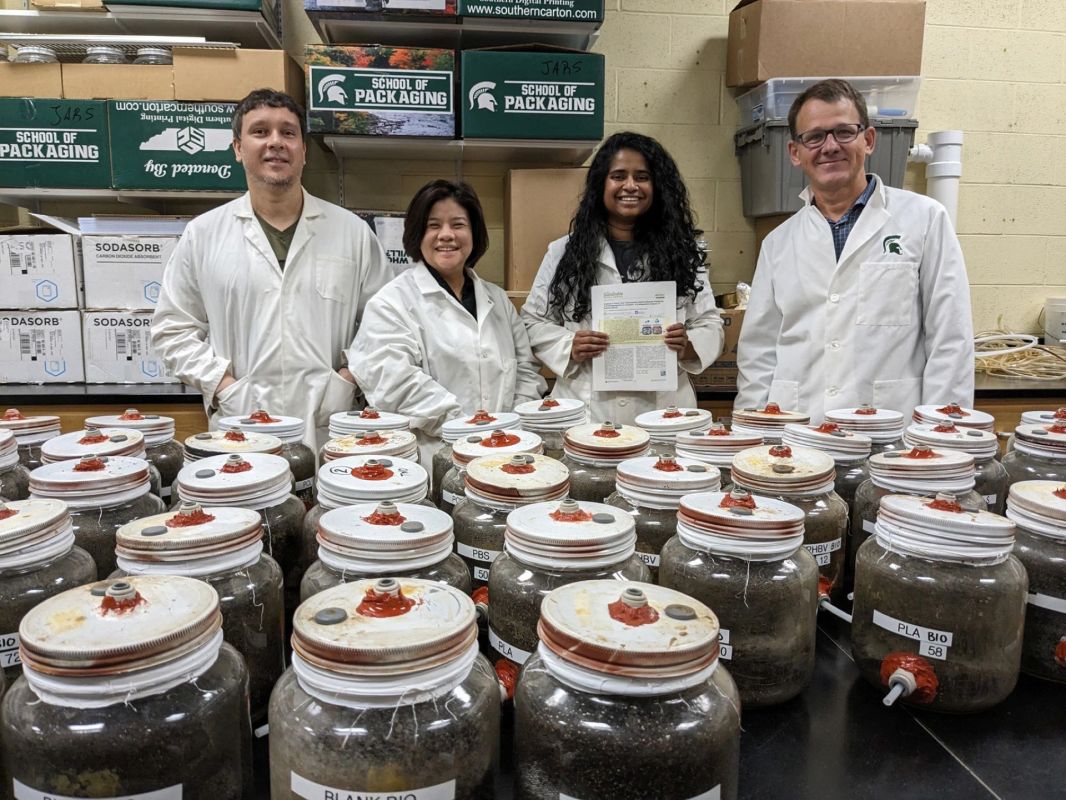Plastics have problems, and researchers working on compostable plastic alternatives are determined to find solutions.
Starting with PLA (polylactic acid), a bioplastic widely used in packaging, researchers from Michigan State University added bio-based thermoplastic starch until they found a "sweet spot" blend with enhanced potential for composting that doesn't compromise the plastic's usability.
The researchers reported their results in the June 20, 2023 issue of ACS Sustainable Chemistry & Engineering.
Through their work, the scientists aim to address issues with not only standard plastics but also alternatives.
Conventional plastics made from petroleum are convenient but toxic to the health of people and the planet. They may take hundreds of years to decompose, and their production and disposal contribute to heat-trapping gases that overheat the planet.
Sources vary on exact numbers, but only about 5% to 10% of U.S. plastic gets recycled. Greenpeace called plastic recycling "a failed concept" because most plastic ends up as litter or landfill even when put in recycling bins.
"By developing biodegradable and compostable products, we can divert some of that waste," Rafael Auras, the MSU professor who led the new research, told MSUToday.
🗣️ If you compost your food scraps, what's your primary motivation?
🔘 Improving my garden's soil 🌱
🔘 Saving money on fertilizer 💰
🔘 Helping the planet 🌎
🔘 I don't compost 🚫
🗳️ Click your choice to see results and speak your mind
Currently, plastic alternatives labeled "biodegradable" or "compostable" are also complicated and confusing. They may be made from nontoxic, renewable materials (such as corn sugars) and create less heat-trapping gas. But they generally only degrade with industrial-compost concentrations of heat and microbes, and they prove troublesome even at industrial facilities.
Plus, if you've ever pondered the best way to dispose of a compostable container, you're not alone. Bioplastics baffle consumers.
The new PLA-plus-starch blend would simplify decisions because it would make packaging truly compostable, even in a backyard bin.
The starch "gives composting's microbes something they can more easily chow down on while the PLA degrades," explained MSUToday.
"I remember people laughing at the idea of developing PLA home composting as an option," Pooja Mayekar, a doctoral student and the research report's first author, told MSUToday. "That's because microbes can't attack and consume PLA normally."
If more plastics are composted than recycled, it also reduces the resources spent — in time, water, and energy — removing contaminants. This is one of the headaches of plastic recycling. But a container headed for compost often doesn't need to be cleared of food residue.
While the new research shows "completely compostable" plastic is possible, Auras and his team point out that this doesn't guarantee commercial use any time soon. And educating people about composting conditions needed to break down bioplastics will be necessary so consumers don't see a "biodegradable" label and assume it's fine to litter.
Reducing plastic production and reusing containers that are already produced are other important parts of dealing with the impacts of plastic.
"There's not going to be one solution to the entire problem of plastic waste management," Mayekar told MSUToday. "What we've developed is one approach from the packaging side."
"It's really easy to just blame plastic for its problems," she added. "But I think we need to change the conversation about how we manage it."
Join our free newsletter for weekly updates on the coolest innovations improving our lives and saving our planet.









